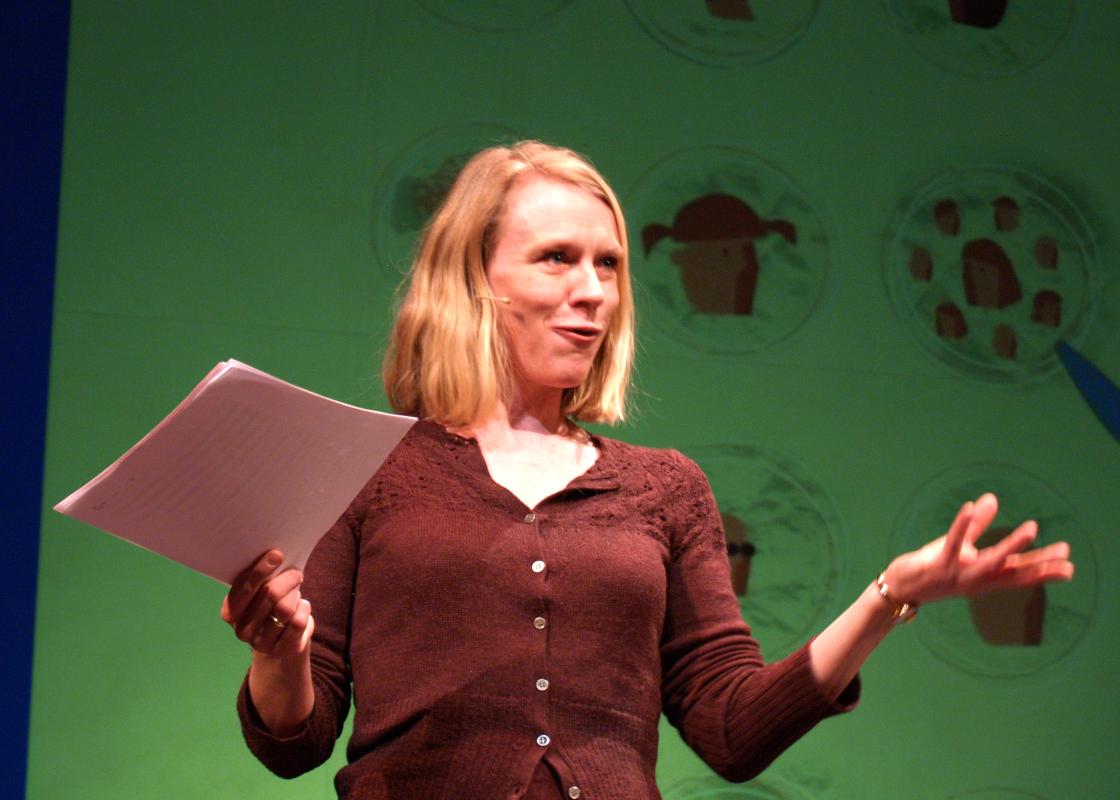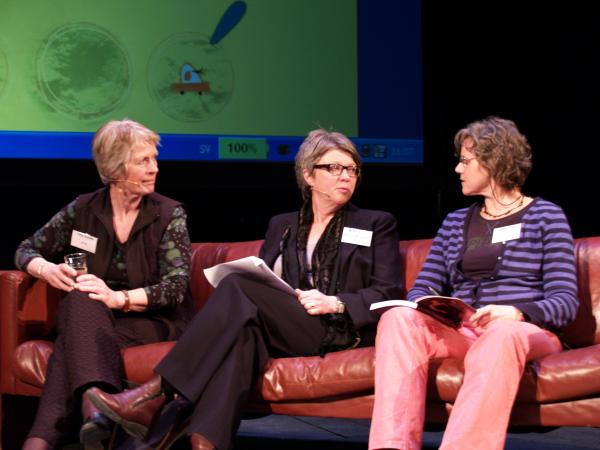
The range of issues was large when the Norwegian gender research community celebrated and summed up its efforts at Det norske teatret on 15 April. The Gender Research Programme for 2001-2007, Knowledge, boundaries, change, rounded off with a lively conference in Oslo, where researchers from most of the programme’s projects presented some of their findings.
Useful research
Minister of Children and Equality Anniken Huitfeldt, who opened the conference, stressed how useful gender research is.
– Hardly anything has meant more to the women’s rights movement than gender research, said the minister.
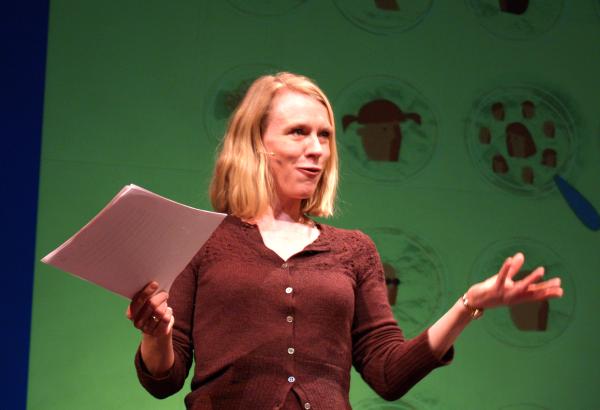
– In our efforts to achieve gender equality we don’t need suppositions. We need knowledge and documentation, she said, and pointed to a number of important questions where research has contributed: Are birth figures affected by gender equality policy? Which relationships last longer – the ones with traditional gender roles with regard to housework, or the ones where both parties contribute equally? What is it like to be voluntarily childless in Norway? What constitutes a good father?
– Our action plans against female genital mutilation and forced marriage are based on gender research. So is our knowledge of subjects like masculinity and homosexual relationships, said the minister.
Relevant
Next up was the resigning chairwoman of the programme, Anne Jorunn Berg, who proudly stated that Norwegian gender research is refreshing, innovative and of high quality.
– Some critics claim that gender research is too political; others claim that it is all about remote and incomprehensible theory. Neither view is correct. Norwegian gender research poses relevant questions as to how Norwegians can lead full, equal lives, said Berg.
– For a while gender researchers participated in the talk show Først og sist almost every Friday night! Doesn’t this prove that gender research deals with everyday issues that people can relate to, she asked.
The meaning of sex
Sexuality in all its various forms is a natural part of a gender research conference. Two recently published books which have sprung out of the programme, were presented by Siri Lindstad, editor of the feminist periodical Fett.
Wenche Mühleisen and Christel Sverre have written “Meningen med sex: Noen kunstneriske, populærkulturelle og vitenskapelige undersøkelser” (The meaning of sex: Some artistic, pop cultural and scientific studies). The book was originally going to be an exhibition, and mixes genres like art, literature and research.
– It was interesting to draw on art and the humanities when exploring sexuality, a field which has mainly been dealt with by psychologists and sexologists. Art is a part of society without any requirement for it to have a function. This provides an opportunity to ask “unusual” questions, said Mühleisen.
– No such thing as a pure sexuality
Trine Annfelt, Britt Andersen and Agnes Bolsø, all from The Norwegian University of Science and Technology, have published the anthology “Når heteroseksualiteten må forklare seg” (When heterosexuality must explain itself). The basis of the book is that heterosexuality is normative and regulates everyone’s existence, regardless of sexual orientation or gender. A number of contributors show how this works in different areas.
– One example is the notion that everyone must have a sexual identity – either homosexual or heterosexual. In order for the individual to attain well-being and good mental health this identity needs to be stabilised. The idea is that homosexuals first come forward, and then receive recognition and respect, said Agnes Bolsø.
– One might ask how relevant this view on homo- and heterosexuality is, when sexual pleasure in reality is so multi-faceted. No one has a pure sexuality. Homosexuality invades the heterosexual fantasy world – and vice versa, she said.
Trisexual
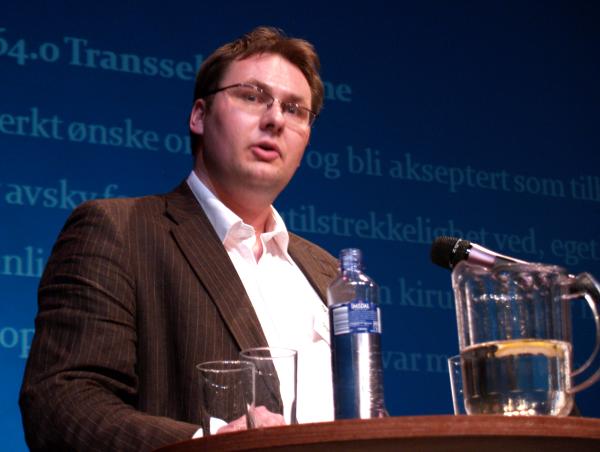
Ethnologist Tor Folgerø from the University of Bergen was amongst the 24 researchers who spoke at the conference research marathon, where each speaker had 15 minutes to present their material. Folgerø’s 15 interviews with Norwegian transsexuals reveal numerous ways of adapting to the combination of body, gender and sexuality. Many of them want medical treatment in order to change genders, some don’t, and some want a bodily “mix” of genders. Folgerø’s research subjects have both heterosexual, homosexual and “unclear” sexual practices. One calls himself a “trisexual”.
– But it is conspicuous that most of them show little interest in relationships or sexuality. They are concerned with binary genders, but not with binary sexualities. The daily struggle to act out one’s preferred gender is more important. Many perceive their voice, body hair and face shape as equally important as their genitals, said Folgerø.
“Norwegianness” and equality
Many of the researchers at the marathon linked their presentation to a debate on the Norwegian gender equality discourse. One was the research director for gender and society at the Institute for Social Research, Mari Teigen.
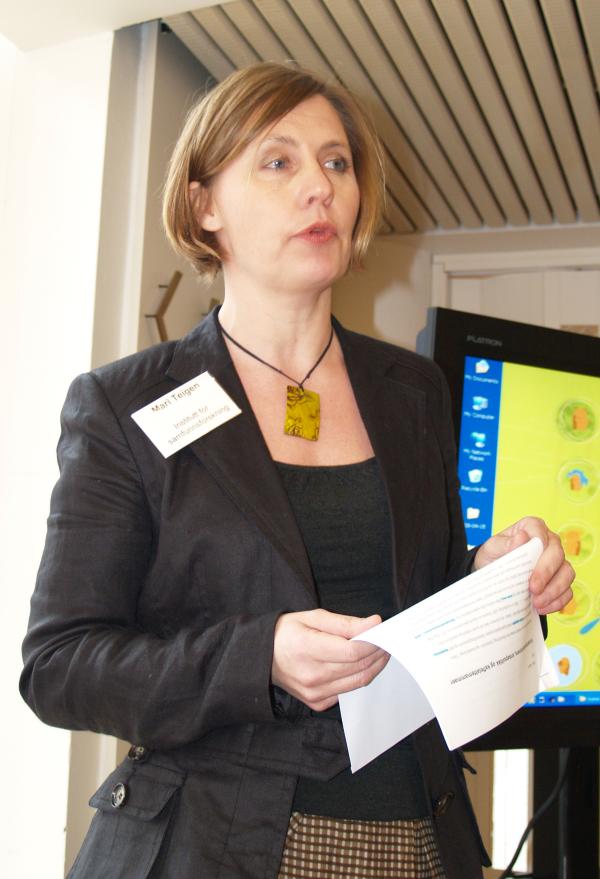
– I see a clear difference between Norwegian and Swedish feminism. In Norway the basic attitude is that gender equality is a linear process; that we constantly move towards more gender equality. In Sweden there is more talk of patriarchal structures, power and the lack of gender equality. Whereas Swedish feminists are furious, young Norwegian feminists want to show that they have a humorous outlook on their own situation, said Teigen.
In her research on the elite and affirmative action in the business world Teigen has identified different tendencies in Norway and Sweden. Both the Norwegian and Swedish elite say they want gender equality. But they have different explanations as to why few women hold leading positions in the business world. In Sweden they usually point to discrimination and power structures. In Norway we tend to individualize the problem by saying that women don’t seek leading positions.
Teigen believes that one reason for this is that Sweden, more than Norway, for the last 15 years has undergone a recession, which has led to an increased focus on power structures.
In Sweden the female representation in parliament dropped, and this caused a renewed interest in feminism. Today there are 50 per cent women in the Swedish parliament, but in Norway there are still only 40 per cent women – the quota minimum. This may suggest that the image of Norway as “the country of equality” to some degree obstructs gender equality.
More Norwegian than goat cheese
Also Ann Therese Lotherington from the University of Tromsø (UiT), who along with amongst others Anne Britt Flemmen (also from UiT) has studied Russian women’s lives in Norway in the project «Når kvinner krysser grenser» (When women cross borders), talked about the Norwegian gender equality discourse.
The Russian-Norwegian women’s views on Norway show how the gender equality discourse is an integral part of creating Norwegianness, according to the Tromsø researchers’ material. Their ideas of Norway and Norwegian culture revolve around equality, with gender equality as a central ingredient. To some of the Russian women, being Norwegian is practically the same as being equal.
– Norwegianness is taken as a standard of gender. Norwegianness and gender govern each other. To these women being equal is a far more important sign of Norwegianness than brown cheese and skiing, said Lotherington.
– Gender equality needs to be problematized
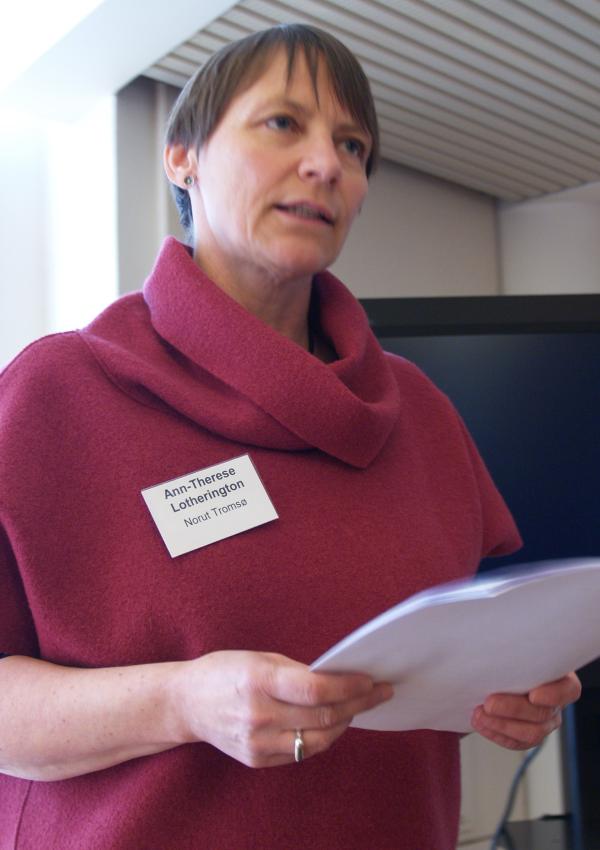
Theoretical reflection on gender equality is one of the main subjects in the new programme for gender research which begins this year, emphasised the chairwoman of the new programme’s board, Unni Langås, in her speech.
– Gender equality is not a value neutral term. It needs to be problematized. Should the demands on gender equality vary in different areas of society, like work, family and politics? What happens to the Norwegian gender equality ideology upon encountering the multicultural society and totally different perceptions of gender? Today there is not even agreement as to what gender equality is, said Langås.
The seven-year programme Knowledge, boundaries, change has had nearly NOK 60 million to spend on various projects. The new gender research programme, which runs from 2008 to 2012, has around NOK 56 million at its disposal.
– The first deadline for applying for project funding was in February, and we received sixty applications. The only thing I am sure of is that we have more worthy projects than we are able to support, the new chairwoman stated.
Translated by Vigdis isachsen
The Gender Research Conference 2008 rounded off the research programme Gender research: Knowledge, boundaries, change in The Research Council of Norway. The programme lasted from 2001 to 2007. Its budget was NOK 60 million, and has provided funding for 32 research and network projects, more than 20 different events, as well as several books, movies and other educational material.
The programme is now replaced by Programme for gender research 2008 – 2012. This programme will have around NOK 56 million at its disposal. Sixty applications for project support had been submitted by the first deadline in February 2008. The next and last opportunity to apply for funding will probably be in 2009.
Detailed information on the researchers and programmes is available on the new web site kjønnsforskning.no, which went live during the gender research conference.
